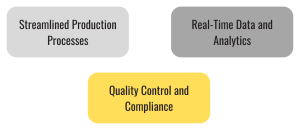Why Custom Software is the Right Choice for Your Business
Introduction Having the right software can make all the difference. With the rise of technology and digitalisation, businesses of all sizes are relying on software to streamli...

Introduction
Having the right software can make all the difference. With the rise of technology and digitalisation, businesses of all sizes are relying on software to streamline their operations, improve efficiency, and stay ahead of the competition. While there are many off-the-shelf software solutions available in the market, they may not always meet the specific needs and requirements of your business. This is where custom software development comes in. In this article, we will explore the benefits of custom software and why it is the right choice for your business.
Moreover, the rapid advancement of technology has made it possible for businesses to leverage software solutions to automate their processes, improve customer service, and make data-driven decisions. However, not all software solutions are created equal. Off-the-shelf software, while convenient and readily available, may not always provide the flexibility and customisation that businesses need to truly optimise their operations. Custom software development offers a solution to this problem, providing businesses with software that is tailor-made to their specific needs and requirements.
Understanding Custom Software
Custom software, also known as bespoke software, is a tailor-made software solution designed and developed specifically for a particular business or organisation. Unlike off-the-shelf software, custom software is built from scratch to meet the unique needs and requirements of a business. This means that it is highly customisable and can be tailored to fit the specific processes, workflows, and goals of a business.
In addition to being highly customisable, custom software also offers a high level of flexibility. This means that as your business grows and evolves, your software can be easily adapted to meet your changing needs. This is in stark contrast to off-the-shelf software, which often comes with rigid features and functionalities that may not be able to accommodate changes in your business operations or strategies. With custom software, you have the freedom to modify and upgrade your software as needed, ensuring that it always aligns with your business objectives.
Advantages of Custom Software

1. Tailored to Your Business Needs
One of the biggest advantages of custom software is that it is tailored to your business needs. Off-the-shelf software may have features and functionalities that are not relevant to your business, leading to a cluttered and confusing interface. With custom software, you have the freedom to choose the features and functionalities that are essential for your business, making it more efficient and user-friendly.
Furthermore, bespoke software allows you to prioritise the features and functionalities that are most important to your business. This means that you can focus on developing and improving the aspects of your software that directly contribute to your business goals, rather than wasting resources on unnecessary features. This level of customisation can also lead to a more intuitive and user-friendly interface, as your employees will only be interacting with features and functionalities that are relevant to their tasks.
2. Increased Efficiency and Productivity
Custom software is designed to streamline and automate your business processes, leading to increased efficiency and productivity. By eliminating manual and repetitive tasks, your employees can focus on more important tasks, leading to better utilisation of time and resources. This can also result in cost savings for your business in the long run.
In addition to streamlining your business processes, bespoke software can also help to improve the accuracy and reliability of your operations. By automating tasks, you can reduce the risk of human error, which can lead to costly mistakes and inefficiencies. Furthermore, custom software can provide you with real-time data and analytics, allowing you to monitor your operations and make data-driven decisions to further improve efficiency and productivity.
3. Scalability and Flexibility
As your business grows and evolves, so do your software needs. With custom software, you have the flexibility to add new features and functionalities as your business expands. This means that your software can grow with your business, eliminating the need for constant upgrades or switching to a new software solution.
Moreover, bespoke software is designed to be scalable, meaning that it can handle an increase in workload without compromising performance. This is particularly important for growing businesses, as it allows them to accommodate growth without having to invest in new software or hardware. With custom software, you can ensure that your software solution is always capable of meeting your business needs, no matter how much your business grows or changes.
4. Competitive Advantage
In today’s competitive business landscape, having a unique and efficient software solution can give you a competitive advantage. Bespoke software is designed specifically for your business, giving you a unique edge over your competitors who may be using off-the-shelf software. This can help you stand out in the market and attract more customers.
Furthermore, custom software can help to enhance your brand image and reputation. By providing a unique and efficient software solution, you can demonstrate your commitment to innovation and customer satisfaction. This can help to build trust and loyalty among your customers, giving you a competitive edge in the market. In addition, custom software can also help to protect your business from competition, as it is difficult for competitors to replicate a custom software solution.
5. Better Integration with Existing Systems
Custom software can be seamlessly integrated with your existing systems and processes, making it easier to adopt and implement. This means that your employees do not have to learn a completely new system, saving time and resources. It also ensures that all your systems are working together efficiently, leading to a more streamlined and cohesive workflow.
In addition to ease of integration, bespoke software can also help to improve data consistency and accuracy across your systems. By integrating your custom software with your existing systems, you can ensure that data is consistently updated and accurate across all platforms. This can help to improve decision-making, as you can rely on accurate and up-to-date data to make informed decisions.
6. Cost-Effective in the Long Run
While custom software may have a higher upfront cost compared to off-the-shelf software, it can be more cost-effective in the long run. With off-the-shelf software, you may have to pay for features and functionalities that you do not need, leading to unnecessary expenses. Custom software, on the other hand, is tailored to your specific needs, eliminating any unnecessary costs.
Moreover, custom software can help to reduce maintenance and upgrade costs in the long run. Unlike off-the-shelf software, which often requires regular updates and upgrades, bespoke software can be maintained and upgraded as needed, based on your business needs. This can result in significant cost savings over time, making custom software a more cost-effective solution in the long run.
Custom Software for Manufacturing Businesses
Custom software is particularly beneficial for manufacturing businesses. With the complex and unique processes involved in manufacturing, off-the-shelf software may not be able to meet all the requirements. Custom manufacturing software can be designed to handle all the specific processes and workflows of a manufacturing business, leading to increased efficiency and productivity.
In addition to improving efficiency and productivity, custom software can also help to improve the quality and consistency of products in manufacturing businesses. By automating processes and implementing quality control measures, bespoke software can help to ensure that all products meet the required standards and specifications. This can lead to improved customer satisfaction and a stronger brand reputation.

1. Streamlined Production Processes
Custom manufacturing software can be designed to streamline the production processes of a manufacturing business. This can include features such as inventory management, production scheduling, and quality control, all tailored to the specific needs of the business. This can lead to faster production times, reduced errors, and improved overall efficiency.
Furthermore, bespoke software can help to improve the coordination and communication between different departments in a manufacturing business. By integrating all processes and workflows into a single system, custom software can facilitate better collaboration and coordination, leading to more efficient and effective production processes.
2. Real-Time Data and Analytics
Custom software can be integrated with sensors and other devices on the production floor to collect real-time data and analytics. This can provide valuable insights into the production processes, allowing businesses to identify areas for improvement and make data-driven decisions. This can lead to better resource allocation, reduced downtime, and improved overall performance.
In addition to providing real-time data and analytics, custom software can also help to improve the accuracy and reliability of data in manufacturing businesses. By automating data collection and analysis, custom software can help to eliminate errors and inconsistencies in data, leading to more accurate and reliable insights.
3. Quality Control and Compliance
Custom manufacturing software can be designed to include quality control and compliance features, ensuring that all products meet the required standards. This can include automated checks and audits, reducing the risk of human error and ensuring consistency in product quality. This can also help businesses comply with industry regulations and avoid any penalties or fines.
Moreover, custom software can help to improve the traceability and accountability in manufacturing processes. By recording and tracking all processes and activities, bespoke software can provide a clear and detailed record of production, making it easier to identify and address any issues or discrepancies.
Choosing the Right Custom Software Development Company
When it comes to bespoke software development, it is crucial to choose the right development company. Here are some factors to consider when selecting a custom software development company:
- Experience and expertise in developing custom software solutions
- Ability to understand and meet the specific needs of your business
- Strong communication and collaboration skills
- Proven track record of delivering successful projects
- Use of the latest technologies and development methodologies
- Timely delivery and ongoing support and maintenance services
In addition to these factors, it is also important to consider the company’s approach to project management and customer service. A good bespoke software development company should be able to provide clear and regular updates on the progress of the project, and should be responsive and attentive to your needs and concerns. Furthermore, the company should be able to provide ongoing support and maintenance services after the project is completed, ensuring that your software continues to meet your business needs and requirements.
Conclusion
Finding the right custom software development company is essential for the success of your project. By taking the time to research and evaluate potential companies, you can ensure that you select the best one for your business needs. A reputable bespoke software development company should have the experience and expertise to deliver a successful project that meets your needs and exceeds your expectations.